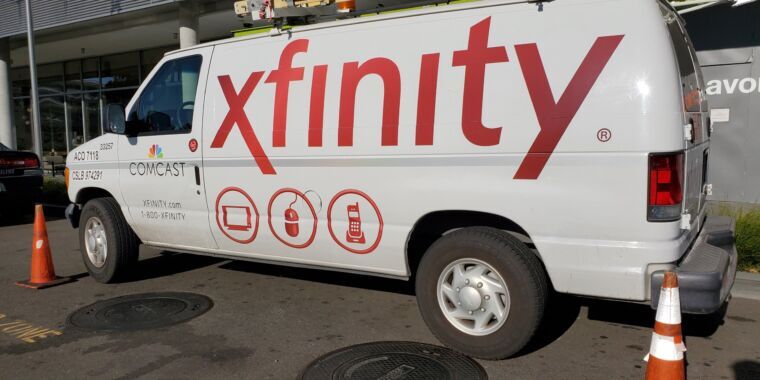Xfinity waited 13 days to patch critical Citrix Bleed 0-day. Now it’s paying the price::Data for almost 36 million customers now in the hands of unknown hackers.
deleted by creator
In Europe this would be a hard to explain breach of GDPR. Which could result in some hefty fines. Especially if it is a vulnerability they knew about but chose to wait.
Are they in Europe? My guess is no.
Sure, but given that the poster said “would” the point is to bring additional awareness to how consumer-backing laws with actual teeth can bring about positive change, and perhaps to motivate citizens to support similar legislation and legislators who would write it.
In the real world, fines are a cost carried to the customer. So even with GDPR, the customer is still the loser in the situation.
Not in the EU. Fines can actually hurt here
So fines come with a requirement that a company can’t raise prices to recoup them?
Do you think companies aren’t already pricing their products at the maximum they think the market can bear?
They are, that won’t stop them going higher.
This thinking was brought up to convince people not to hold companies accountable.
Make it cost. And if the company refuses to correct the behavior they shouldn’t be allowed to operate. If there is no cost for bad behavior then said behavior becomes how you do business.
Products are already priced at the point that will make them the most profits. That point doesn’t magically change when fines happen.
It’s a bullshit headline all the way around. They may have waited like 9 days to patch it, but the exploit had been shown to be on their system (and many other companies) for several months. Essentially, the extra 9 days after the vulnerability was discovered and a patch existed wouldn’t have mattered much for anything. Ship already long since sailed.
The customers are paying the price, not them.
Their a last Mile Telco Monopoly. They’re not paying the price for anything. Nobody does business with Comcast who has a choice. All of their customers are captured.
Yup, I’m one of those people. I call Verizon every six months asking if they service my location yet.
It’s not paying the price lol they won’t be held accountable and they know that, it’s the customers paying the price. These headlines are so stupid nothing but ragebait garbage.
The representative declined to say why company admins didn’t patch sooner.
In the corporate world, staying quiet and doing nothing is often safer for your ass than doing something that could cause downtime (such as emergency patching).
Sooo glad my employer moved away from Citrix in favor of Parallels years ago. Dealing with the Citrix client was a nightmare of epic proportions. Imagine the shitstorm with our clients if something like this were to happen to us.
This is the best summary I could come up with:
Comcast waited 13 days to patch its network against a high-severity vulnerability, a lapse that allowed hackers to make off with password data and other sensitive information belonging to 36 million Xfinity customers.
Exploits disclose session tokens, which the hardware assigns to devices that have already successfully provided login credentials.
The name Citrix Bleed is an allusion to Heartbleed, a different critical information disclosure zero-day that turned the Internet on its head in 2014.
That vulnerability, which resided in the OpenSSL code library, came under mass exploitation and allowed the pilfering of passwords, encryption keys, banking credentials, and all kinds of other sensitive information.
A sweep of the most active ransomware sites didn’t turn up any claims of responsibility for the hack of the Comcast network.
Comcast is requiring Xfinity customers to reset their passwords to protect against the possibility that attackers can crack the stolen hashes.
The original article contains 436 words, the summary contains 147 words. Saved 66%. I’m a bot and I’m open source!
Oh fuck THIRTEEN WHOLE DAYS? That really ain’t that bad. 30 days for a you’d from CVE is quicker than industry standard.
In all fairness, 13 days is a fairly quick turnaround for patching in the enterprise. The breach was only 6 days after disclosure. They were almost certainly in the planning stages already when this happened.
I used to be the head of IT in a large organization that worked with clients in highly regulated sectors. They all performed regular audits of our security posture. Across the board, they expected a 30 day patch policy. For high profile vulnerabilities like this one, they would often send an alert and expected imminent action within a commercially reasonable time frame. We would get it done anywhere from 24 hours to days later depending on the situation and whether there were complications. It was usually easy for us because we were patching every device and application on the network every couple weeks anyway. A hotfix is much easier to deploy when everything is up to date already and there are no prerequisite service packs. We knew we were much faster than most and it took a lot of work to get there. Thirteen days is a little slow for a 0-day by our standards but nowhere near unreasonable.
The reality is many enterprises don’t patch at all or don’t do it completely. They may patch servers but not workstations. They may patch the OS but not the applications. It’s common to find EOL software in critical areas. A friend of mine did some work for a railroad company that had XP machines controlling the track switches. There are typically glaring holes throughout the company when it comes to security. Most breaches go unreported.
Look, I hate Comcast as much as anyone. They suck. But taking 13 days to patch isn’t unreasonable. Instead, people should be asking why there weren’t other security layers in place to mitigate the vulnerability.





